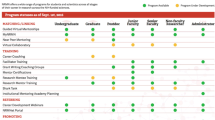Abstract
Multiple factors, including job satisfaction, personality traits, and training experiences, influence the career trajectory of hematology/oncology fellows. In an effort to expose hematology/oncology fellows to (1) the various careers in oncology, (2) a diverse group of speakers for future mentorship, and (3) research opportunities, and grant writing experience, we established an annual career development and research retreat. During the retreat, we engaged speakers who covered a range of career trajectories, including academic, private practice, industry, government, and administrative paths. We introduced clinicians and researchers with a track record of providing top-notch mentorship to fellows with aligning interests and detailed research opportunities and grant writing. The sessions were led by senior fellows, and we adopted an in-person and virtual hybrid model to allow speakers from various institutions to participate. Feedback from participants, as gathered through surveys, indicated positive responses: all respondents reported that this retreat was “extremely” or “very helpful,” and a majority expressed their intent to pursue academic careers. The curriculum and structure of this retreat may help to inform the development of fellowship career development and research retreats at other institutions.


Similar content being viewed by others
Data Availability
The data that support the findings of this study are available from the corresponding author upon reasonable request.
References
Horn L, Koehler E, Gilbert J, Johnson DH (2011) Factors associated with the career choices of hematology and medical oncology fellows trained at academic institutions in the United States. J Clin Oncol 29(29):3932–3938
Boulmay B, Prowell T, Blaya M, Pietanza MC (2018) No decision is final: career planning and career transitions. Am Soc Clin Oncol Educ Book 38:881–886
Shanafelt T, Chung H, White H, Lyckholm LJ (2006) Shaping your career to maximize personal satisfaction in the practice of oncology. J Clin Oncol 24(24):4020–4026
Roberts DA, Faig J, Bodio-Downey K, Shpilsky J, Leahy K, Wischhusen J, et al. Training hematologists/oncologists for the academic-community hybrid: creating a fellowship framework for the future. JCO OncolPract 0(0):OP.22.00671
Straus SE, Straus C, Tzanetos K (2006) Career choice in academic medicine: systematic review. J Gen Intern Med 21(12):1222–1229
Denson JLOE, Huie TJ (2018) The career development and research retreat: leading by example. American Thoracic Society (ATS), San Diego, California. https://www.thoracic.org/professionals/career-development/fellows/innovations-in-fellowship-education/2018/thecareer-development-and-research-retreat-leading-by-example.php
Besterman AD, Williams JK, Reus VI, Pato MT, Voglmaier SM, Mathews CA (2017) The role of regional conferences in research resident career development: the California Psychiatry Research Resident Retreat. Acad Psychiatry 41(2):272–277
Beasley BW, Simon SD, Wright SM (2006) A time to be promoted. The prospective study of promotion in academia (prospective study of promotion in academia). J Gen Intern Med. 21(2):123–9
Hoover EL (2005) Mentoring surgeons in private and academic practice. Arch Surg 140(6):598–608
Shanafelt TD, Raymond M, Horn L, Moynihan T, Collichio F, Chew H et al (2014) Oncology fellows’ career plans, expectations, and well-being: do fellows know what they are getting into? J Clin Oncol 32(27):2991–2997
Shanafelt TD, Raymond M, Kosty M, Satele D, Horn L, Pippen J et al (2014) Satisfaction with work-life balance and the career and retirement plans of US oncologists. J Clin Oncol 32(11):1127–1135
Medisauskaite A, Kamau C (2017) Prevalence of oncologists in distress: systematic review and meta-analysis. Psychooncology 26(11):1732–1740
Shanafelt TD, Gradishar WJ, Kosty M, Satele D, Chew H, Horn L et al (2014) Burnout and career satisfaction among US oncologists. J Clin Oncol 32(7):678–686
Naciri A, Radid M, Kharbach A, Chemsi G (2021) E-learning in health professions education during the COVID-19 pandemic: a systematic review. J Educ Eval Health Prof 18:27
ASCO (2023) Leadership development program. https://old-prod.asco.org/career-development/leadership-programs/leadership-development-program. Accessed 26 Jul 2023
Warsi A, Dawdy K, Bishop M, Khader J, Amiel G, Heneghan K et al (2023) Leadership, leading, and influencing change in cancer education: development and assessment of a pilot leadership workshop in cancer education for interdisciplinary healthcare staff. J Cancer Educ 38(2):697–712
Author information
Authors and Affiliations
Contributions
All authors contributed to the study conception and design. ARL and GMC contributed equally to this paper, by organizing the retreat presented, conceptualization, methodology, formal analysis, investigation, data curation, writing—original draft. EC-R, NF, UD, SY, HF, KS, DC, AS were all past chief fellows that performed a career development retreat in their respective years and contributed to the investigation and writing. JP and TJH were the program directors that assisted in facilitating the career development retreat and contributed to the investigation and writing of this paper.
Corresponding author
Ethics declarations
Conflict of Interest
ARL, GMC, ECR, UD, HF, KS, DC, AS, JP, and TJH state no conflicts of interest.
NF’s disclosures are as follows:
Advisory/consulting: Merck, Pfizer, Mirati, AstraZeneca, Regeneron, and NeoGenomics, Inc. Research funding: Genentech.
SY’s disclosures are as follows:
Advisory Board: Astrazeneca (Institutional- no personal compensation). Research funding: Astrazeneca, Repare Therapeutics (Institutional).
Additional information
Publisher's Note
Springer Nature remains neutral with regard to jurisdictional claims in published maps and institutional affiliations.
Supplementary Information
Below is the link to the electronic supplementary material.
Rights and permissions
Springer Nature or its licensor (e.g. a society or other partner) holds exclusive rights to this article under a publishing agreement with the author(s) or other rightsholder(s); author self-archiving of the accepted manuscript version of this article is solely governed by the terms of such publishing agreement and applicable law.
About this article
Cite this article
Lewis, A.R., Choong, G.M., Cathcart-Rake, E. et al. Preparing Hematology/Oncology Fellows for Success: Implementing an Annual Career Development and Research Retreat. J Canc Educ 39, 58–64 (2024). https://doi.org/10.1007/s13187-023-02375-9
Accepted:
Published:
Issue Date:
DOI: https://doi.org/10.1007/s13187-023-02375-9



